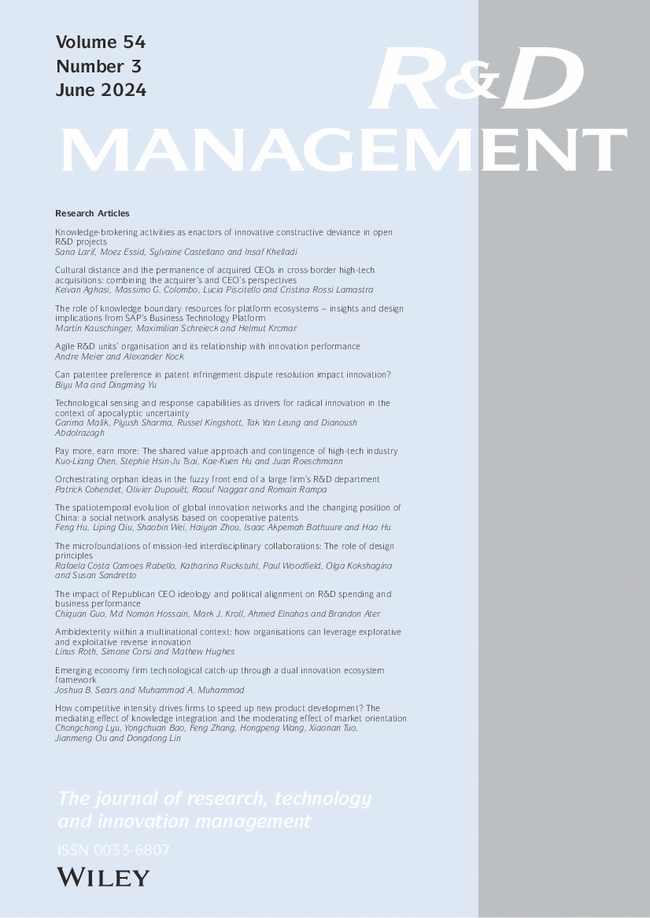Knowing too much? On bias due to domain‐specific knowledge in internal crowdsourcing for explorative ideas
IF 5.7
2区 管理学
Q1 BUSINESS
引用次数: 1
Abstract
Internal crowdsourcing utilizes a firm’s employees, of which many have a strong understanding of the domains in which the firm operates, for contributing with, developing and evaluating ideas. On the one hand, these employees can use their domain-specific knowledge to identify the value of what may seem a far-fetched solution to the average employee. On the other hand, previous research has shown that employees typically evaluate ideas in their domains less favorably if they do not align with ongoing exploitation activities. Hence, this study focuses on whether a higher degree of relevant domain-specific knowledge makes employees participating in internal crowdsourcing prefer exploitative solutions when evaluating ideas. An empirical study of an online platform for firm-internal innovation in a multinational engineering company showed that employees who only infrequently participated in internal crowdsourcing mostly contributed to and evaluated ideas within their own domain. Employees who frequently participated also contributed to and evaluated ideas outside their own domains. By statistically analyzing group differences during idea evaluation, we show that employees participating infrequently favor exploitable solutions, whereas employees participating frequently are more uncertain. The former difference is only seen concerning ideas that require domain-specific knowledge to understand, but the latter is observed for all types of ideas. This study makes three substantial contributions. First, employees with domain-specific knowledge, through their preference for exploita-tive solutions, bias the outcome of internal crowdsourcing when idea evaluation requires domain-specific knowledge. Second, this bias is aggravated by the overall higher level of uncertainty displayed by employees participating frequently in internal crowdsourcing and thereby tend to reach out to other domains.知道的太多?关于探索性想法的内部众包中特定领域知识的偏见
内部众包利用公司的员工,其中许多人对公司运营的领域有深刻的理解,为贡献、发展和评估想法做出贡献。一方面,这些员工可以使用他们特定领域的知识来确定对普通员工来说似乎遥不可及的解决方案的价值。另一方面,先前的研究表明,如果员工的想法与正在进行的剥削活动不一致,他们通常会对自己领域内的想法不那么有利。因此,本研究关注的是,参与内部众包的员工在评估创意时,是否更倾向于利用性的解决方案。对一家跨国工程公司内部创新在线平台的实证研究表明,很少参与内部众包的员工大多在自己的领域内贡献和评估想法。经常参与的员工也会对自己领域之外的想法做出贡献和评估。通过统计分析创意评估过程中的群体差异,我们发现不经常参与的员工更倾向于利用性的解决方案,而经常参与的员工则更不确定。前者的区别只体现在需要特定领域知识才能理解的想法上,而后者则适用于所有类型的想法。这项研究有三个重要贡献。首先,拥有特定领域知识的员工,通过他们对剥削性解决方案的偏好,在想法评估需要特定领域知识时,会对内部众包的结果产生偏见。其次,频繁参与内部众包的员工所表现出的总体较高的不确定性加剧了这种偏见,从而倾向于接触其他领域。
本文章由计算机程序翻译,如有差异,请以英文原文为准。
求助全文
约1分钟内获得全文
求助全文
来源期刊

R&D Management
Multiple-
CiteScore
11.30
自引率
9.50%
发文量
0
期刊介绍:
R&D Management journal publishes articles which address the interests of both practising managers and academic researchers in research and development and innovation management. Covering the full range of topics in research, development, design and innovation, and related strategic and human resource issues - from exploratory science to commercial exploitation - articles also examine social, economic and environmental implications.
 求助内容:
求助内容: 应助结果提醒方式:
应助结果提醒方式:


